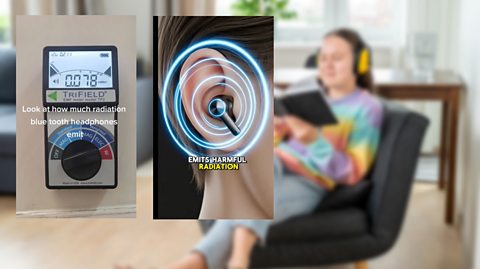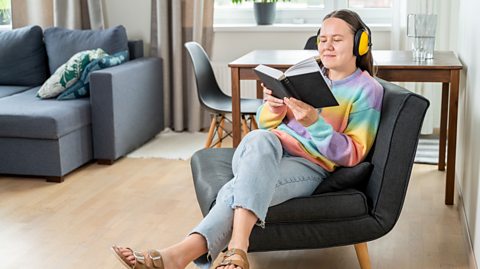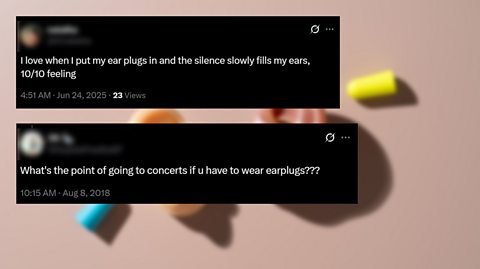How safe are wireless headphones?

With so much music and so many podcasts available to stream these days, it’s perhaps no wonder that headphones are so popular.
According to data company Statista, we spend around one billion pounds each year on them in the UK alone, with wireless headphones especially in demand. While many users love them, there have also been concerns on socials about their potential health risks. BBC Bitesize Other Side of the Story took a closer look behind those concerns to separate the facts from the fake.
Wireless headphones (both over-the-ear and inner-ear) use Bluetooth technology to connect with our phones. This involves an electromagnetic field and has led some people to believe it could harm our brains.

There has been scientific research into wireless headphones and their potential risks. They emit a type of radiation called radiofrequency radiation, which operates at a much lower frequency than the kind of radiation which can cause harm to humans. In 2019, Cancer Research UK stated that there wasn't enough evidence that Bluetooth headphones could cause harm and that studies involving large groups of people found no connection to an increased cancer risk. However, as of 2025, research into the effects of wireless headphones on our health is continuing.
Noise-cancelling headphones are a relatively new invention. They contain special software that cancels out external noise such as the TV or a dog barking, allowing the user to focus solely on one sound.
They vary in price, from less than £50 to well over £100 and higher. Which? magazine, where a team of experts test different makes and models of various products, found that it was possible to get good quality noise-cancelling features on headphones that cost around £50, so it isn't always necessary to spend a lot of money - but how much someone spends is entirely up to them in the end.
Other Side of the Story spoke to Claire Benton, president of the British Academy of Audiology, to find out more abut noise-cancelling headphones. Claire explained that they can help protect people's hearing as focusing on one sound with all others cancelled out, means it doesn't need to be listened to at a loud level.
"You still have to follow good listening hygiene," Claire said. "Give your ears breaks from listening, keep the level down at a safe listening level regardless, because the temptation is still to turn it up. Some people really enjoy loud music and we do know that is really dangerous if you do it for too long. Eighty-five decibels(db) for eight hours is what the [official] regulations say is safe, without any hearing protection."
Eighty-five db is the equivalent of the noise made by heavy traffic or a food blender. If you listened to something just three db louder, Claire said, the amount of time you could listen to it safely suddenly halves from eight hours to four.

Claire added: "If you're the sort of person that gets easily distracted by external noise or finds background noise intrusive, noise-cancelling headphones can be helpful to make you feel calmer in those noisy places.
"Questions are starting to be raised that if you use noise-cancelling headphones far too much, it can possibly alter your auditory processing skills. There is a possibility that wearing noise-cancelling headphones for far too long disrupts your ability to process speech in noise when you're not wearing them, but it's purely at the moment."
Noise-cancelling headphones are one way to reduce sound levels, but aren't practical for a live event such as a concert or music festival. However, these are the type of environments where it's worth looking after your ears - and ear plugs may be an option.
Royal National Institute for Deaf People (RNID) research found that 58% of people aged between 18 and 28 suffered some form of hearing loss or hearing-related issue after exposure to loud music. Most of the time, the effects don’t last, but continuing to expose our ears to such loud environments can have lasting damage. The new style of ear plugs, which are becoming popular at festivals, allow sound through but at a reduced level, which can make it easier to attend these events if loud noise levels make you uncomfortable.

Ear plugs do work. Even the cheapest foam plugs create a barrier between external sound and the ear canal - although care is advised when inserting and removing them.
The average music festival has sound levels of between 90db and 100db, whereas the human ear can cope safely with prolonged listening to sound of no more than 80db.
Saira Hussain is an audiologist, who told the BBC Sounds Sliced Bread podcast her thoughts on ear plugs: “From a healthcare perspective, I’m glad there’s an awareness now, or greater awareness, about protecting your hearing from noise. So definitely, when you are going to a festival… definitely have something to protect your ears.”
Check out this clip from Sliced Bread of Saira talking about ear plugs.
Greg: Saira, do these cheap earplugs block out enough sound to protect your ears, if you're workingin a loud environment every day?
Saira: We would advise that you do wear some sort of noise plug when you are somewhere noisy. Ifyou're working in construction, for example, if you have a noisy job, these wouldn't fit the mark,you would need to go for sort of the ear defenders.
Trevor Cox, who also appeared on Sliced Bread, is Professor of Acoustic Engineering at the University of Salford. He said that, if buying a set of plugs, he would look for ones that advertised a specific reduction in decibels. However, he did add: “I wouldn’t trust to buy them because I wouldn’t know what they do until they arrive.”
This article was published in August 2025

Not sure if the news you’re seeing on social media is true or false? Can you always tell if the things you see online are real or fake? Learn how to get the other side of the story with our quizzes, videos and explainers.
BBC





